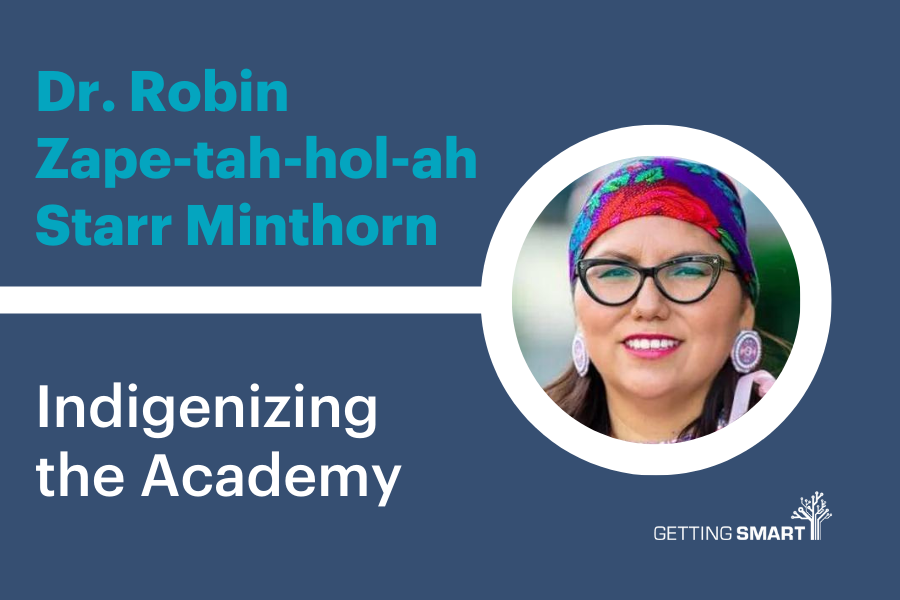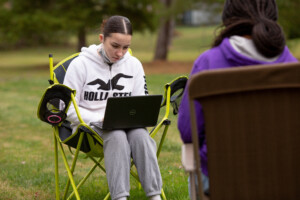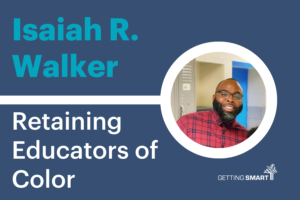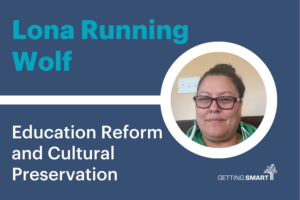Dr. Robin Zape-tah-hol-ah Starr Minthorn on Indigenizing the Academy
Key Points
-
It’s critical to align culture values to curriculum.
-
We have to be good caretakers: of our children, the earth, our elders — this starts with a connection to place.

This episode of the Getting Smart Podcast is part of a new short monthly series where Mason Pashia is joined by Dr. Jason Cummins, a previous guest and a friend of the podcast, to speak with indigenous leaders and academics to discuss how indigenous ways of knowing and leading can, and should, shape the education system.
Awaachiáookaate’, or Jason Cummins Ed.D is an enrolled member of the Apsaalooke Nation, and recently served as the Deputy Director for the White House Initiative on Advancing Educational Equity, Excellence, and Economic Opportunity for Native Americans and Strengthening Tribal Colleges and Universities, Office of the Secretary. Previously, he was the principal at Crow Agency Public School. As an Indigenous scholar and school leader he has innovatively worked to lead schools towards authentically serving Native American students PreK-12 and their communities by implementing culturally sustaining, trauma-informed, and restorative approaches.
Dr. Robin Zape-tah-hol-ah Minthorn is a member of the Kiowa Tribe of Oklahoma, Apache, Nez Perce, Umatilla and Assiniboine and is currently the Professor and Department Chair at the College of Education at Oklahoma University. At the time of this recording, Dr. Minthorn was a professor at UW Tacoma.
Prior to her time in Washington, Dr. Minthorn served as Coordinator of Native American Affairs at Oklahoma State University and an adjunct faculty at Pawnee Nation College. Preceding that, as an academic advisor at Comanche Nation College, which is Oklahoma’s first tribal college. Dr. Minthorn also co-founded Gamma Delta Pi, American Indian Sisterhood and RAIN (Retaining American Indians Now) as an undergraduate at the University of Oklahoma. As an academic professional, she co-founded ONASHE (the Oklahoma Native American Students in Higher Education) Conference.
“When we talk about the association between education and boarding schools it still lives with our youth because [the intergenerational trauma] lives in their parents and grandparents.”
Dr. Robin Zape-tah-hol-ah Starr Minthorn
Transcript
Dr. Jason Cummins: So, I actually came into contact with Dr. Minthorn’s work through a couple of really good colleagues of mine. Dr. Sweeney Windchief was working on a book that Dr. Minthorn edited, called Reclaiming Indigenous Research in Higher Education, and it’s a great work. I think you also edited another book, Unsettling Settler Colonialism—I might be getting the title a little wrong. Another colleague of mine, Holly Mason, was involved in that work too. Holly came out to Washington State and met Mr. Windchief, and we started visiting. It turned out that he was married to Dr. Minthorn, and I thought, “Wow, small world.” The world of Indigenous educators is not that large.
Robin Minthorn: Yes, that’s true.
Dr. Jason Cummins: Especially within our fields of Indigenous research and leadership. So, it’s really a collegial crowd, and that’s how I came into contact with the work here, reading much of it before meeting the author.
Dr. Jason Cummins: Yeah, that’s how we’ve come to this point.
Mason Pashia: Beautiful. Robin, would you mind telling us a little bit about some of the work that you’re involved with and what you’re thinking about these days?
Robin Minthorn: Sure. I’m an associate professor here in the School of Education at the University of Washington Tacoma, and I’m also the director of our doctoral program in Educational Leadership and director of Indigenous Education Initiatives. This is our fourth year living in the Pacific Northwest, and I’ve been fortunate to be part of developing a tribal partnership with the University of Washington and the Muckleshoot Tribe. We’ve been working on that over the last four years, starting in August or September 2018, and we signed a memorandum of agreement with the Muckleshoot Tribe in February 2020. This partnership led to our first doctoral cohort, tribally placed on Muckleshoot Tribal land, which started during the summer of 2020, right in the middle of the pandemic. We recently graduated that cohort last week and are starting our second cohort next Friday. They’ll be taking classes at UWT Tacoma and Muckleshoot Tribal College.
We’ve also signed another memorandum of agreement for a master’s in education. We have 18 students in the Muckleshoot master’s cohort, which started last autumn. This cohort is tribally placed, with Native faculty teaching, Indigenous-centered scholarship, and curriculum focused on Indigenous education. I could share more on the scholarship aspect, but that’s a look at the local work I’m involved in.
Dr. Jason Cummins: So, how important is it to train and produce Indigenous leaders in this space? What’s the significance and need there?
Robin Minthorn: It’s really important because there aren’t many Native people across the U.S. who have doctoral degrees. Not that doctoral degrees are everything, but having that qualification is essential when moving into leadership roles within public school systems, higher education, and broader educational systems. Developing Indigenous leaders in these spaces allows them to work with a foundation in their Indigenous or tribal identity. When I went through my doctoral program, I couldn’t incorporate my Indigenous identity as much as I can now. Being able to center that is especially vital here in the Pacific Northwest, where we have initiatives like “Since Time Immemorial” in Washington State. There’s a need for superintendents, principals, and other leaders to build and maintain nation-to-nation relationships, focusing on tribal governance and accountability. Having Native leaders who can navigate both their Indigenous identity and the complexities of the education system is crucial.
Dr. Jason Cummins: One thing about Washington State that I really appreciate is the nation-to-nation relationship requirement. To be a principal or superintendent in the state of Washington, you need five hours of training on how to consult with tribal nations. This is to help secure state-level Title VI funding and other funding sources, which requires tribal consultation at both state and local levels. It’s progressive and innovative for a state to say, “We respect the status of Native nations, and we’re training our educators to honor that.” How does the program approach this consultation and the nation-to-nation relationship status?
Robin Minthorn: One focus is incorporating “Since Time Immemorial” (STI) into our program, including our on-campus doctoral cohort. We encourage students, especially those pursuing superintendent or program administration roles, to understand tribal sovereignty and who the local tribal people are in their school districts. This approach emphasizes sustainable relationships with tribal communities, not just nation-to-nation but deeply connected relationships. For those unfamiliar, STI is a curriculum requirement implemented statewide in Washington since 2015. It mainly focuses on social studies, incorporating tribal narratives for all students.
We’re also working with the Professional Educator Standards Board (PESB) and the Washington Council of Education Administrative Programs (WCEAP), engaging with superintendent and principal programs statewide to integrate STI into their curriculums. Although STI implementation is required, there isn’t always adequate funding to support it, so part of our work is advocating for resources. This way, tribal nations aren’t expected to shoulder all the work, and we ensure educators understand what tribal sovereignty means for implementing STI in schools, regardless of the student population.
Mason Pashia: And STI stands for Since Time Immemorial, correct?
Robin Minthorn: Yes, Since Time Immemorial.
Mason Pashia: Great. Just a quick audio note, Robin—your microphone is hitting your necklace a little when you move, so if you could just keep an eye on that. Thanks!
Robin Minthorn: Oh, okay, yes, thank you.
Mason Pashia: I have a follow-up question. You mentioned how your program is more accepting of people showing up as their full selves, including their Indigenous identity. What does that look like in practice for someone who’s allowed to bring an Indigenous lens to a leadership role? How would that manifest differently compared to the past?
Robin Minthorn: When I started in this role as the program director, the curriculum was built around Western-oriented values, with an emphasis on accountability and traditional leadership frameworks. In my first year, we reassessed our approach and redesigned the program from a decolonial perspective. We restructured 22 courses to focus on five values: ancestral knowledge, relational learning, disrupting and dismantling, healing, and one more I may be forgetting. We connect each course, reading, and assignment to these values.
Empowering doctoral students to be authentic in their leadership practices allows them to help their students feel similarly empowered in the classroom. Honoring the unique identities of Indigenous and BIPOC teachers, and recognizing the diverse lived experiences they bring, fosters a space where everyone can bring their full selves to their teaching practice.
Mason Pashia: That makes so much sense. Thank you for explaining that, Robin. Dr. Cummins?
Dr. Jason Cummins: I just want to add to the discussion that honoring place is essential. Often, it takes courage for educators to enter a school system and say, “This educational experience isn’t very relevant to the students I’m serving,” especially if those students come from BIPOC communities or non-mainstream backgrounds. There’s pressure to let education continue as is, but it takes courage to advocate for a more relevant education. I have people talking in the hallway here, so sorry if there’s a bit of background noise.
Mason Pashia: No worries, Dr. Cummins, we can hear you just fine.
Dr. Jason Cummins: Thanks. There was a quote I heard last week, I think from Dr. Michael Yellow Bird. He said, “Decolonizing work is not rebellion; it’s healing.” That really struck me. Robin, what does it mean to you to indigenize or heal the academy and school leadership?
Robin Minthorn: I love that quote and Dr. Yellow Bird’s work as well. To me, indigenizing the academy means being who we are in these spaces. I was discussing decolonizing the academy recently, and we asked, “What does that even mean?” Decolonizing means moving away from colonial mindsets, systems, and structures that weren’t designed with Indigenous people in mind. These systems, whether in higher education or K-12, were created to assimilate and colonize us.
Indigenizing the academy, on the other hand, is about creating spaces that represent who we are as Indigenous people, incorporating our values, and aligning with how we live in our tribal communities. For example, with our first Muckleshoot cohort, students formed strong relationships and identified as a cohort of sisters. This sense of familial connection and relationality is inherently Indigenous. Whether we’re working in Washington, D.C., or Washington State, we have a responsibility to be good relatives, which means caring for the earth, our children, and our elders. To truly indigenize the academy, we need to be connected to place. If we’re disconnected from place, we’re upholding the colonial structures that were meant to harm us.
Dr. Jason Cummins: Yeah, I think that’s a crucial point. We need to speak more in educational circles about the complicated history of school systems, particularly regarding Native American populations. The recent boarding school report from the Department of the Interior highlighted how these systems were originally designed to displace Native peoples from their lands.
Robin Minthorn: Absolutely. I want to reference Dr. Hannalei O’Hara of the Puyallup Tribe, who completed her dissertation by interviewing Puyallup tribal elders about their educational experiences. She discovered that, despite today’s schools not being boarding schools, elders who had gone through boarding school still felt an emotional reaction when entering school buildings. It reminded them of their boarding school experiences, and they would need to take a breath before entering.
This is an example of how intergenerational trauma lives on. It affects not only our grandparents and parents who experienced boarding schools directly but also today’s youth, who carry the weight of their ancestors’ experiences. So, when we talk about student success, it looks different for Native students. Success might mean having food on the table, access to water, or being the first in the family to graduate high school. Transitioning to higher education is a huge step, and for principals and superintendents, understanding these dynamics is crucial. Building real relationships with Indigenous communities and asking, “What does education look like for you?” helps provide the necessary support for Native youth to thrive, survive, and, ultimately, succeed.
Mason Pashia: That’s powerful. I heard a similar sentiment recently at a conference on teacher development. A colleague said we need to ensure we’re not asking people to return to the “scene of the crime” if they’re considering becoming educators. That really connects with what you’re saying about creating spaces that heal rather than retraumatize.
I have a question about place, but Dr. Cummins, did you want to add anything?
Dr. Jason Cummins: Yes, I was just reflecting on my own experience as an educator. Education is a deeply rewarding field, but it’s also challenging, especially for Native educators who may feel they’re revisiting traumatic experiences. We often replicate what we’ve seen done, and sometimes that includes internalized biases toward our own communities.
It takes self-reflection to undo those biases and recognize the valid concerns of our communities. Education should be empowering, but that requires us to rethink how we approach leadership. Paulo Freire’s work on liberation pedagogy comes to mind. He suggests that if we’ve only seen leadership as exploitation, we may replicate that when given power. We need to consciously shift that mindset in education.
Mason Pashia: Thank you for sharing that, Dr. Cummins. This question is for both of you: Dr. Minthorn, you mentioned moving to Washington four years ago, and Dr. Cummins, I know you’re also currently away from home. How do you think about adapting to a new place, especially in a leadership role? How can we equip leaders to recognize, respect, and empower place?
Robin Minthorn: That’s a great question. Before moving to Washington, I spent seven years in New Mexico. I was born in Oregon, but I grew up in Oklahoma, with tribal roots in Oklahoma, Oregon, Montana, and Idaho. Whether Indigenous or not, when we move to a new place, it’s essential to approach it with humility, knowing we’re there to learn. I would never position myself as an expert on the tribes of New Mexico or Washington, even if I stayed for decades. My role is to listen, to learn, and to defer to the people whose land this is.
For administrators and educators, it’s crucial to acknowledge who we’re connected to in that place. In Puyallup, where I’m currently based, the Puyallup River and the land here are deeply connected to the Puyallup people. An elder here taught my husband Gabe and me to say “háʔnəš” or “thank you” every time we cross the bridge over the river, remembering where the water comes from and its connection to Mount Tahoma (Rainier). This mindfulness connects us to place, reminding us to consider how our actions impact not only Indigenous communities but all people. It’s about relationality with both human and non-human elements.
Dr. Jason Cummins: I love that—being a good guest and being a learner. That reminds me of the need for humility and respect when coming into a new community. My mentor, who lived in our community for over 40 years, always said he was still a guest, even after being adopted and learning the culture. He never presumed to speak as an expert for our community, and I think that kind of balance and respect is crucial.
Mason Pashia: Extending the idea of being a guest, is there a view in tribal communities that everyone is a guest, even on Earth? Is there a perspective of being a guest in relation to place and stewardship?
Dr. Jason Cummins: I haven’t heard it framed exactly that way, but it’s an interesting thought.
Robin Minthorn: My teachings from my grandparents include the practice of gifting when we host visitors. My grandma would always give something to people before they left, whether it was food or a small gift. I try to continue this practice, making sure people who visit me leave with something, even if it’s just a bag of snacks.
It’s also important to note that Indigenous communities are not homogenous. What being a guest or tribal member means varies by tribe. For instance, the Puyallup Tribe recognizes community members who are Native but not Puyallup. However, in some places, like parts of New Mexico, non-tribal members may need to leave during certain ceremonies. Respecting these customs and understanding that practices differ is essential for anyone moving to a new community.
Dr. Jason Cummins: I appreciate that perspective. In your work empowering Indigenous leaders in education, how does Indigenous knowledge benefit the larger educational community?
Robin Minthorn: For me, leading with my identity as an Indigenous person has been empowering, not only for myself but for others as well. When I began my faculty role in 2012, I participated in a workshop where I conceptualized my values and teaching philosophy. This empowered me to be authentic in my leadership, and it seems to have empowered others to do the same.
For example, a Black leader in our program thanked me at graduation last Friday, saying he appreciated being able to bring his full self into the program. Hearing that from a Black man in an educational leadership program, where he felt he had the space to be himself, was a huge compliment. Many places don’t allow Black men to show up as their authentic selves, and that’s something I’m proud of in our program.
Dr. Jason Cummins: That’s powerful. Thank you for sharing that, Robin. It’s a testament to the important work you’re doing.
Mason Pashia: Absolutely. This has been an incredible conversation. Robin, you mentioned that you might be moving soon. Can you share what’s next for you?
Robin Minthorn: Yes, I’m moving to the University of Oklahoma at the beginning of August. It’s been a difficult decision because I’ve loved my time here, but I’m returning to my home community where I grew up. After being away for 11 years, I’m excited to bring back what I’ve learned to my people and other tribes in Oklahoma. I’m not coming back to “bring” anything in the sense of imposing something new; rather, I’m looking forward to working with them and building on the work they’re already doing. I want to find ways to strengthen the initiatives that are already in place. At the same time, I hope to keep connections with the Pacific Northwest, particularly with the Muckleshoot Tribe and the Puyallup people here. Once you’re tied to a local community or tribal community, you never truly leave it—you’re always connected. I still have ties in New Mexico, and I feel a responsibility to maintain relationships there as well. So I’m looking forward to building connections across New Mexico, Washington, and Oklahoma, knowing that we need more Indigenous leaders in these spaces, and we also need non-Indigenous leaders to acknowledge and respect Indigenous sovereignty, relationships, and place.
Mason Pashia: Absolutely.
Dr. Jason Cummins: Thank you, Robin, and congratulations on this new opportunity. It’s exciting work.
Mason Pashia: Congratulations, Robin! Dr. Cummins, do you have any closing thoughts or reflections?
Dr. Jason Cummins: Just a short question, actually. Robin, what kinds of dispositions do you believe leaders need in these spaces?
Robin Minthorn: That’s a great question. I’ve been building on some of the work I did editing a book on Indigenous leadership in higher education. We had 21 contributors, including 16 Indigenous leaders in higher ed and six Indigenous students. One key takeaway from that book was the importance of knowing who we are as Indigenous people, recognizing Indigenous knowledge, and acknowledging our connection to place.
I’ve also been developing ideas around being a “good relative,” which includes honoring our ancestors, telling our stories, acknowledging our connections, finding our medicine, and leaving a legacy. These qualities aren’t exclusive to Indigenous people—they’re relevant to anyone. If we focus on leadership in a human and relational way, connected to place and community, I believe we can be better stewards for future generations.
Dr. Jason Cummins: Thank you, Robin. That was wonderful.
Mason Pashia: So important. Thank you both. Robin, Dr. Cummins, it’s been such a pleasure to hear your perspectives and insights today. Robin, if you need any additional help as you transition, please let us know.
Robin Minthorn: Thank you, Mason, and thank you, Dr. Cummins, for the invitation. If you need me to rerecord or clarify anything, just let me know.
Mason Pashia: Of course.
Dr. Jason Cummins: Thank you, Robin. It’s been a pleasure.
Links:







0 Comments
Leave a Comment
Your email address will not be published. All fields are required.